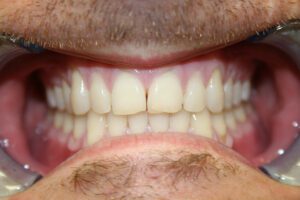
Tooth sensitivity can feel like anything from a quick zing of pain to lingering discomfort that makes eating, drinking, and brushing difficult. If you are experiencing sensitivity, understanding the root cause is the first step toward relief.
What Is Tooth Sensitivity?
Tooth sensitivity occurs when temperature, pressure, or certain flavors cause discomfort in a tooth. This happens when the underlying dentin or root surface becomes exposed.
You may feel sensitivity when you eat or drink something:
- Hot
- Cold
- Sweet
- Sour
- Spicy
Some people experience sensitivity even without visible signs of a cavity.
Why Do My Teeth Feel Sensitive?
There are several reasons why sensitivity may develop.
1. Enamel Erosion From Diet
Foods and drinks that contain acids can weaken enamel over time. These include:
- Citrus fruits
- Tomatoes
- Coffee and tea
- Vinegar-based foods
If enamel becomes thin, temperature changes reach the tissue beneath the enamel more easily, causing tooth sensitivity.
2. Gum Recession
When gums recede, the roots of the teeth become exposed. Because roots are not protected by enamel, they react strongly to temperature.
3. Dental Conditions
Tooth sensitivity is often linked to:
- Cavities
- Gingivitis or periodontal disease
- Cracked teeth
- Worn fillings
These conditions create a direct pathway to the tooth nerve.
4. Brushing Habits
Brushing too aggressively or using a hard-bristled toothbrush can:
- Wear down enamel
- Cause gums to pull away
- Create areas where bacteria collect
5. Whitening Products
Professional whitening treatments are safe and effective, but some people may experience temporary post-whitening sensitivity.
If sensitivity is preventing you from whitening your smile, ask your dentist about gentle, customizable teeth whitening options designed to reduce discomfort.
6. Recent Dental Procedures
Sensitivity is common for a short time after fillings, cleanings, or other treatments.
How Do I Reduce Tooth Sensitivity?
These steps can help ease discomfort and protect your teeth long-term.
1. Brush Gently and Effectively
- Use a soft-bristled toothbrush.
- Brush for at least two minutes without pressing too hard.
- Choose toothpaste formulated for sensitivity.
2. Limit Acid Exposure
If you enjoy citrus or acidic foods, rinse your mouth with water afterward. Avoid brushing immediately after acidic meals since enamel is temporarily softened.
3. Improve Daily Hygiene
Consistent brushing, flossing, and professional cleanings help prevent gum recession and decay.
4. Consider Fluoride Treatments
Fluoride strengthens enamel and reduces sensitivity. Your dentist can recommend in-office or at-home options.
When Is Tooth Sensitivity an Emergency?
Most cases are not urgent, but there are situations where you should contact an emergency dentist right away, including:
- Sudden, severe sensitivity that interferes with eating or sleeping
- Sensitivity caused by trauma or a cracked tooth
- Swelling, fever, or signs of infection
- Pain accompanied by visible holes, chips, or gum changes
If discomfort is intense or worsening, you may need urgent care to prevent further damage.
Find Relief From Tooth Sensitivity
Tooth sensitivity is common, but it is not something you need to live with. If your symptoms are persistent or severe, schedule a visit at Dr. Q’s office in Monrovia so we can determine the cause and recommend the right treatment.
If you are experiencing intense or sudden discomfort, you may need emergency dentistry support.

